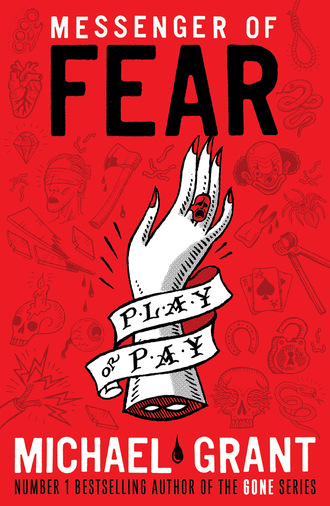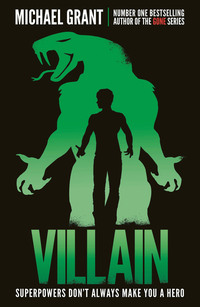
Полная версия
Messenger of Fear
“Your memory has been disturbed by the transition.”
“Well, I need my memory.”
“Do you?” He tilted his head and looked at me as if my image was evoking something from another time and place. He wasn’t looking at me, Mara; he was looking at something I reminded him of.
“Look, Messenger,” I said, trying to sound determined, “I don’t know what you want of me, but I won’t cooperate unless I know who I am and . . .” I hesitated there, for the next words would perhaps reveal too much of the vulnerability I felt. Then, with a sigh that fluttered in my chest, I finished, “. . . and what I am.”
I swear that then he almost smiled. It was nothing that I could see, but the slight lessening in the rigidity of his features allowed me to think that he was possibly smiling.
“Yes. Memory,” he said.
And then, I remembered.
5
I saw what I looked like. I saw my face. My body. And with it, memories of earlier stages of my life. Me a year ago. Me three years ago. Me as a little girl taking gymnastics.
My locker combination was 13-36-9.
My grade point average was 4.0.
I was five feet, five inches tall and hoped against all odds to grow taller.
I weighed 121 pounds.
I knew my social security number.
I knew my student ID number.
I knew my driver’s license number, which surprised me because I didn’t think I’d ever memorized that.
It was as if every number I’d ever known was coming bubbling up into my brain. My home was at number 72. My birthday was July 26. My phone number . . .
“That’s not what matters,” I said.
“I thought you wanted to see your memories,” Messenger said.
“Those aren’t the memories. Those aren’t what I need. Did you do that to me? Can you turn my memory on and off?”
He surprised me by giving a direct answer. “Yes.”
“That’s not fair!” The words were out of my mouth before I’d even begun to think about them.
“Fair.” He said the word with something like reverence. Like the word had deep significance to him. “I’m sorry you find me unfair, but I think you are mistaken. You don’t yet understand, and whether it is fair or not in your judgment, I will hold your memories. I will hold them back.”
“What? Who says? I mean, what?”
“It’s part of the deal you made,” Messenger said.
I froze.
“What?”
He did not repeat himself. So I did.
“What? What do you mean, it’s the deal I made?”
“You must trust me, Mara.”
“Trust you? I don’t even know your name. I don’t even know what you are. I don’t know where we are or why. Trust you?”
“Yes, Mara. You must trust me.”
I stared at him, and this time I did not lower my eyes but met his gaze. “What is this about?” I asked.
He could have easily sidestepped such a poorly phrased question. But he did not. Instead he chose to answer, emphasis always on “chose” because though I didn’t yet know it, I was entirely in his power. At that moment, and for a long while after as well, I belonged to Messenger. I was his to control.
“This,” he said without the least drama or emphasis, “is about true and false. Right and wrong. Good and evil. And justice, Mara. This is about justice. And balance. And . . .” He nodded as if to himself rather than to me. “. . . and redemption.”
I said nothing. What is there to be said after such a speech?
He seemed vaguely amused that he had silenced me. And he took the opportunity to point a finger and invite my gaze to turn in the direction he indicated.
“It is also, at this moment, about Samantha Early.”
And there she was, Samantha Early, no longer at school but at her laptop computer in a Starbucks. She was chewing on her upper lip, concentrating, typing in stops and starts. Pause, then a sudden flurry. Pause, then a sudden flurry.
“What is she writing?” I asked.
“She’d already written it when she died,” Messenger said. “As to what she wrote, go and look.”
We were outside the Starbucks, looking in through the window. I went for the door, reached for it with my hand, and found that it seemed to slip away. I thought at first I had just missed, but a second attempt had the same result. On a third attempt I watched carefully and moved my hand slowly. I expected to see my hand pass in a ghostly way through the solid object. And what does it reveal about my state of mind that I expected that?
But rather than my insubstantial hand passing through a solid object, it was the door handle that moved. It was there, and then, an instant before my fingers would have touched it, it was gone. And the moment I withdrew my hand, it was back.
“You cannot alter what you see around you,” Messenger instructed. “You may see all but touch nothing. What you see is all past, and the past may not be changed.”
“How do I see what she’s writing if I can’t open the stupid door?” I said. I was annoyed by the door, irrationally annoyed. It was strange to be irritated by something so small in these wanderings with a strange boy through an impossible universe. But maybe it was easier or safer to be bothered by things that seemed familiar.
The deal I made.
Did I even want to know how I had come to make a deal with Messenger? And why had he said that I may see but not touch? Why may and not can? That word choice hinted at rules, and rules come from a person or institution.
“I need time,” I said. “I need to . . . to rest.” If I could just sit down somewhere, digest, put things together. Think.
“It’s a lot to understand,” Messenger allowed. “But the understanding will only come by living it.”
“Or you could explain it,” I snapped.
“Do you want to know what Samantha Early is writing?”
I have a fatal weakness: I am the cat curiosity killed. “Yes, of course I want to know. The girl is going to kill herself. Maybe her writing will tell us why.”
“Then see,” Messenger said.
It was a challenge. Or a test. He wanted to know whether I could find a way into the coffee shop.
The thing I “may” not do was to alter anything around me. I could not touch, could not change. I had a thought then and wondered if it made sense. I could ask Messenger, but I sensed that this would disappoint him, and absurdly, I did not want to disappoint him.
We had become teacher and student, and I have always been a good, if not perfect, student. It’s one of the things I dislike about myself, that willingness to please. Sometimes I dislike it so much that I pick fights with people just to show that I will not be their slave. But this was not the time, and Messenger was not the person. He held my memories. He had power over me. If I were ever to get back to my own reality, escape this . . . this whatever it was . . . then it would be through Messenger.
It occurred to me then that I had a project due. My science project, which was . . . I couldn’t recall what it was, but that single fugitive thought, that anxiety, had crept through whatever blocked my memory and reminded me that I did truly have a need to get back.
My God, was that really my only reason for needing to get back to my life?
I took a deep breath and walked straight toward the Starbucks’ brick-and-plate-glass storefront. I steeled myself for impact and closed my eyes in a flinch.
There was no impact. I was on the other side of the window, inside the coffee shop, standing behind Samantha Early as she typed and paused and typed some more.
This is what I saw on her monitor:
what the French call “l’esprit de l’escalier”. It means “the spirit of the staircase”, but what it’s really about is the way you always think of the perfect comeback after it’s too late, after you’re on the bus heading home from school, or in your mom’s car, or on the staircase, and then, ah hah! The perfect comeback.
Now Jessica knew what she should have said to Elise. She should have said, “I am sad for you that you care so much about how I look and what I wear. It must be hard for you being so superficial.”
That’s what she should have said. But instead she
Messenger was beside me. I did not turn to look at him but said, “She’s a pretty good writer. I wonder what the story is about.”
“Wonder,” he said. It wasn’t an echo, it was an instruction.
So I wondered, and gasped as the whole of it, the 72 pages that preceded that single screen, and the 241 pages that would come after it, were all suddenly known to me. As if I had read it all. No, not that, because even when you read a book, you forget a lot of it. This book, The Nightmare Clique, was known to me in every detail.
“It’s about a group of high school girls who use supernatural powers to bully kids they don’t like,” I said.
“That’s the story. Is it the real purpose of the book?”
I shook my head. “No. No, it’s really about Samantha. She is Jessica. And the nightmare clique is Kayla and her friends.”
Messenger nodded. “Shall we look at the happiest day in Samantha’s life?”
I was not so naive that I didn’t realize there was a danger in this. Seeing Samantha happy would only emphasize the awful tragedy of her death. But Messenger didn’t wait for an answer. Without any sense of movement we were suddenly in a different place. We were at Yolo’s, and Samantha was loading a large Styrofoam dish of frozen yogurt with Reese’s Pieces and Butterfinger crumbles. She paid at the register and glanced around, nervous that someone from school would see her piling on calories.
As soon as she sat down, she ate a big spoonful and while she crunched the cold candies, she checked her email on her phone. I saw the email, and in some way I could not yet hope to explain, I saw it more fully in Samantha’s mind.
It was from a literary agent.
I am very pleased to tell you that I would love to represent The Nightmare Clique. I think there is an excellent chance of selling it to a major publisher, and if you will sign the attached document, I will get to work immediately.
“She thinks she’s going to publish it!” I said. I was excited. There have been times when I thought of becoming a writer, but I would never have had the courage to actually submit a manuscript at my age. Samantha and I were the same age, and she had been brave enough to risk rejection.
I had pitied her. Now I admired her.
“Twenty-seven days on from this moment, HarperCollins will agree to publish Samantha’s book,” Messenger said. “Samantha will read that letter seven times, will have no choice but to read it seven times. She will be frustrated by her compulsion, but she will also be elated. She will tell herself that now, at last, everything will change for the better.”
“But that’s not the way it works out,” I said.
“No,” Messenger said, and we were back in Samantha’s room, and her body was on the floor of her bedroom, stiffening, growing cold as it awaited her mother’s horrifying discovery that her only child was gone.
I shook my head. “I can’t do this, okay? I can’t. You have to let me go. I don’t want to see this. I don’t want to feel this, Messenger, whoever you are, whatever you are, I don’t . . .” I was crying. It should have been humiliating, crying in front of him.
“No one prefers this path,” he said. His voice was flat and devoid of emotion. But I saw something like nausea reflected in his expression. “No one would choose to feel another’s pain. But this is my . . . This is your fate, Mara.”
“No,” I said sharply. “This is all some kind of creepy trick!”
He didn’t deign to reply to that. He waited, silent, as the truth, or at least a part of it, began to sink in.
“I’m being punished,” I said.
Again, he said nothing. I wondered if I could find a way to feel what he was feeling—to know his mind as I had so easily penetrated the mind of Samantha Early—but when I turned my thoughts that way, I felt his mind retreat and fend me off.
It was like the door handle. I could see him, but I was not allowed to touch him. Not physically, not mentally. I was an open book to him, and he was closed to me.
I am not to be touched.
“Not all my . . . our . . . duties are quite so grim,” he said at last. “This terrible matter will hold for a while. And I think you could do with a change of scenery.”
Конец ознакомительного фрагмента.
Текст предоставлен ООО «ЛитРес».
Прочитайте эту книгу целиком, купив полную легальную версию на ЛитРес.
Безопасно оплатить книгу можно банковской картой Visa, MasterCard, Maestro, со счета мобильного телефона, с платежного терминала, в салоне МТС или Связной, через PayPal, WebMoney, Яндекс.Деньги, QIWI Кошелек, бонусными картами или другим удобным Вам способом.







